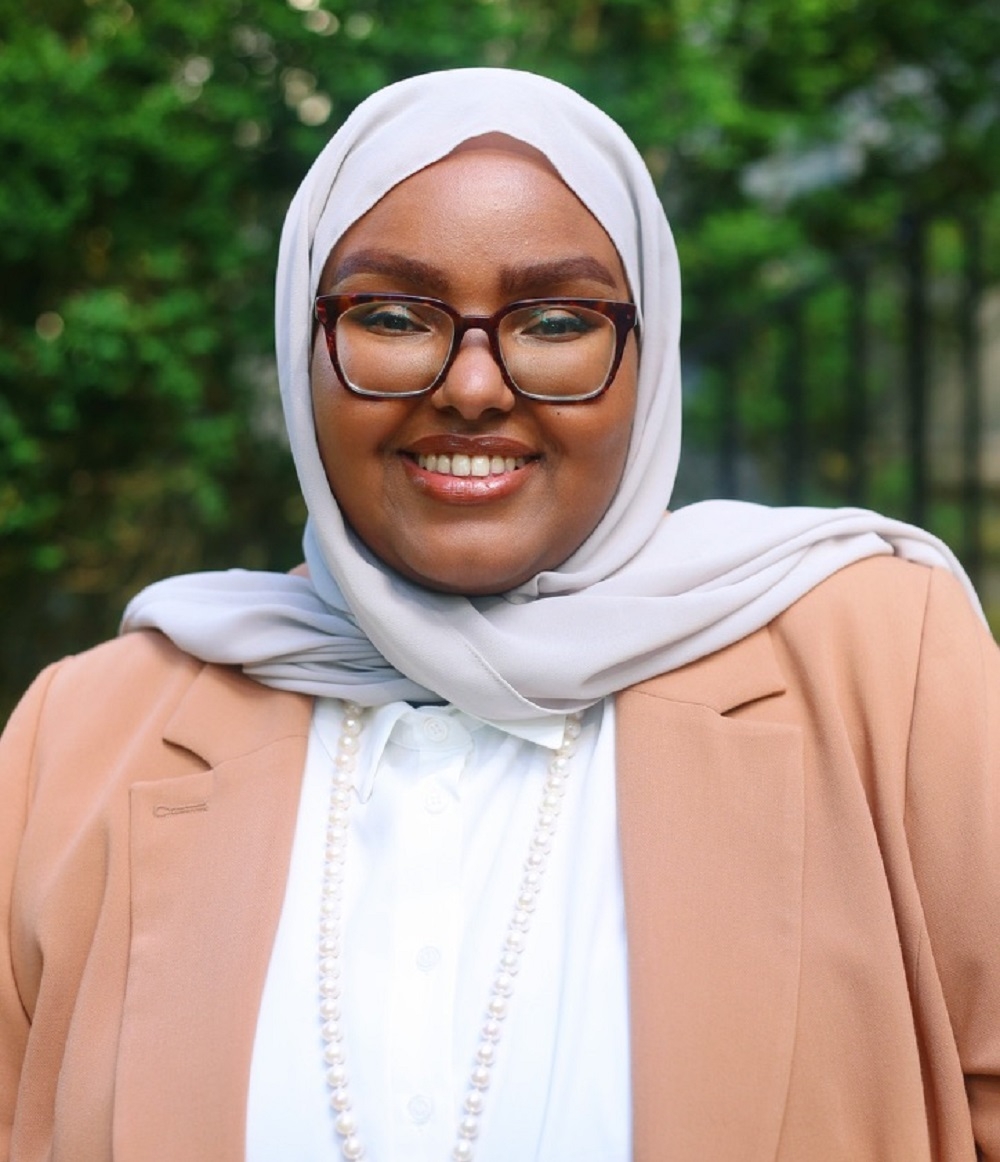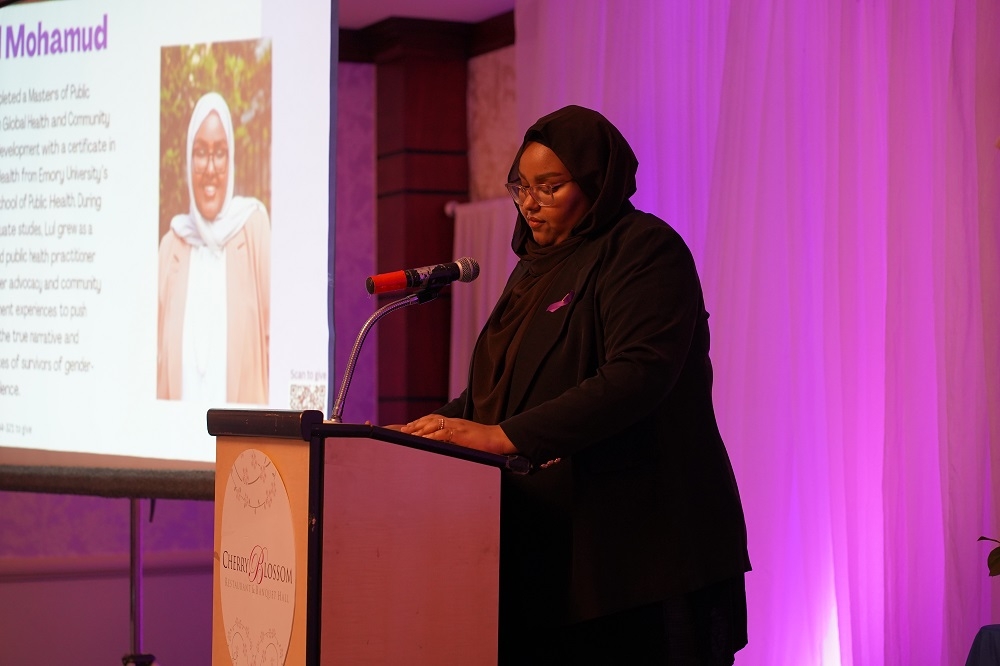'There is No Limit to the Amount of Power You Have to Make a Change in Someone’s Life'
Community
|
Nov 30, 2022
|
7 MIN READ

Lul Mohamud, The Person Center
Editor's Note: This article is part of our annual Women in Charity series. Check back throughout the month for more stories of dynamic Muslim women working in various charitable endeavors and why they do what they do.
For Black and African immigrants and refugees, domestic abuse and trauma is all-to-often a part of their stories upon matriculating to the United States. And while numerous DV organizations exist to help survivors, understanding the unique difficulties and challenges that come from one’s race or cultural background can complicate care. That’s why the work of Lul Mohamud is so important.
Lul, powerhouse leader in servicing survivors of domestic violence, is the fearless leader of The Person Center (TPC), a community-based and grassroots non-profit organization dedicated to providing direct services using culturally specific and trauma-informed person-centered care for those in the Washington, D.C. area. TPC’s unique approach, under the guidance of Lul, has helped numerous Black and African immigrants and refugees manage their trauma and recover from domestic abuse.
Our annual #WomeninCharity series would not be complete without sharing Lul’s story and her life-changing work for Black and African immigrants and refugees who are surviving domestic abuse and trauma. I asked Lul about how the trauma- and culture-informed approach works, why focusing on Black and African immigrants and refugees is important to her and how she wants women to understand that their power and capacity to help others is limitless.
Tell me more about The Person Center – who founded it? How did you get involved?
Lul: The Person Center is a community-based and grassroots nonprofit dedicated to providing direct services using culturally-specific and trauma-informed person-centered care. The Person Center is a one-of-a-kind organization in Washington, D.C. because we are proudly Black immigrant- and women-founded, and currently every staff member, board member and volunteer identifies as a Black or Black immigrant woman.

Lul Mohamud, director of The Person Center
TPC was founded in 2013 by a dedicated and tireless social worker, Amelia Missieledies, who was an Ethiopian immigrant. She was serving survivors of violence in Washington, D.C. and in her day-to-day experiences, she saw repeated systemic failures by agencies, nonprofits and domestic violence responders to address the needs of the African immigrant survivors. And because of that, survivors were often left with no place to go and with no assistance – endangering their lives and the lives of those they love.
Quite frankly, the mainstream domestic violence response sector is now making sweeping commitments to inclusivity and the cause of justice in violence response and prevention. TPC is not new to this; we’re true to this.
Tell us about work you specialize in at The Person Center. What approach do you have in serving your clientele?
The work that we do at TPC is extremely important because it begins with our direct services. Due to our history and the immense legacy and leadership of Amelia, The Person Center will always first and foremost remain a survivor service provider. We currently offer case management, informational referrals, direct financial assistance and crisis management services for Black and African immigrant and refugee survivors of domestic violence. It is important to highlight that TPC’s client advocacy, which includes the services described above, is both in-depth and curated to the specific needs of our survivors, thus TPC support is journey-long.
[This means that] TPC will be there for a survivor throughout their journey to restoration and healing as they define it. Our survivors are often told, directly or through the systems and structures in place, that their survivorship is not valid nor important enough to deem them as victims of abuse.
Our TPC approach was shaped and fortified by the stories we have heard from our survivors, who are a part of the very communities we come from. We are dedicated to our six guiding principles that are integral to our person-centered trauma informed approach to holistic survivor care: Acceptance, Trust, Transparency, Accountability, Justice and Restoration.
The TPC approach begins and ends with ensuring and protecting the dignity of our survivors. African immigrant survivors are often removed from the conversation on violence response or prevention, but more shockingly they're excluded from the understanding of victimhood. This is a historical, systemic and cultural failure to recognize and respect the humanity of African immigrant communities is a direct result of racism and xenophobia that deems this community as inherently invisible and undeserving of the care they need.
No matter who you are, you can save a life through what may appear to be the smallest act of kindness or conviction. So, never underestimate, undersell, doubt or disrespect the power you hold to make a difference in the lives of those you know and those you don’t.
Lul Mohamud, The Person Center
Our survivors are exposed to a variety of vulnerabilities, obstacles and trauma that [are] beyond their control and too difficult to explain – historical, generational and systemic violence [that is] yet to be recognized let alone reconciled. And so, to serve an unrepresented and misunderstood community, we center and respect their voices.
Our trauma-informed and person-centered care approach is uniquely rooted in anti-racist principles, as we understand and believe that Black survivors of domestic violence are also survivors of our American systems and structures of violence. Black survivors have been purposefully placed in environments and systems of violence that perpetuates cycles of socioeconomic, political and cultural oppression.
Why specialize in serving the demographic of African immigrant and refugee DV survivors?
The Person Center was founded to serve African immigrant and refugee survivors of domestic violence who are not only victims of familial and relationship abuse but are often abused by the systems they are forced to navigate. Black immigrant survivors of violence are neglected and harmed by the public health and safety threat of structural, cultural and sociopolitical oppression in the U.S.
The Black immigrant community is statistically vulnerable to various forms of direct violence, including physical and sexual violence, but are also at increased risk of structural violence in the immigration system, socioeconomic disadvantages, healthcare inequities, gender-based inequality and ethnic/religious/racial discrimination. [Source: Nasraddin (2017); Am I not a Woman and a Sister and an Immigrant?: Approaching Intimate Partner Violence in Black Immigrant Communities Within an Intersectional Framework, University of Iowa]
This is why we are dedicated to focusing on these communities.
Tell us about the impact of the work you do on the communities you serve.

Lul Mohamud making a presentation about The Person Center.
In the last year TPC supported 29 survivors of domestic violence, sexual violence, dating violence and stalking. [We] distributed over $10,000 of direct cash assistance to survivors and their families and offered food security, emergency housing, heat and electricity support, and childcare. TPC, in our new education-based prevention initiative, facilitated discussions and community workshops with over 100-plus participants.
What are some misconceptions you want to clarify about the work you do?
The most common misconception regarding domestic violence is that survivors can leave if they want to and that the abuse must not be that bad if they remain in an abusive home. This misconception could not be further from the truth – domestic abuse could include years of harm that you cannot see.
The emotional manipulation, psychological abuse, financial control, spiritual abuse and much more that survivors must endure is designed to strip power, control and self-value and instill fear of life without the abuser. Survivors are coerced into a belief that they cannot survive outside of that abusive relationship, that harm they may experience from an abuser is manageable compared to the unknown as their abuser may have described it.
The most important piece of advice I can share, in all honesty, is very simple: You must remember that there is no limit to the amount of power you have to make a change in someone’s life.
Lul Mohamud, The Person Center
The [other] common misconception is that responders only want to see abusers in prison and survivors separated from their communities and loved ones. The Person Center believes any and all can be restored, including victims who become survivors after finding healing, independence, power and self-love – [this includes] perpetrators who can become trusted and safe after accountability and survivor-centered reconciliation. Strengthening families after addressing harm through accountability and justice is our priority.
What's your advice for women to empower or inspire them to give back in ways that work for them and help the communities they live in?
The most important piece of advice I can share, in all honesty, is very simple: You must remember that there is no limit to the amount of power you have to make a change in someone’s life.
I am honored to have the opportunity to work with survivors – the strongest and resilient individuals you’ll ever see – and I’ve learned that even though some of the women who domestic violence survivors came across or reached out to in their time of need failed to act or help them – there was always the one: the one woman, the one community member, the one mother, the one friend, the one stranger, the one doctor, the one nurse, the one grocery clerk, the one teacher, the one neighbor who decided to choose action and changed their lives for the better. Who, in the smallest way at times – reaffirming that the survivor was right to want to leave or get out of an abusive relationship – changed everything for the better.
No matter who you are, you can save a life through what may appear to be the smallest act of kindness or conviction. So, never underestimate, undersell, doubt or disrespect the power you hold to make a difference in the lives of those you know and those you don’t.
If you would like to get involved with The Person Center, it is looking for sustainers and advocates willing to bring the mission of TPC to the forefront as a fundraiser and as an dvocate for TPC response and prevention initiatives to your community. Any donation can make a difference in a survivor’s life and support our team. Please reach out to TPC (Facebook, Instagram, Twitter) @personcenterdc. Or, visit the TPC website to learn more and/or make a donation (www.thepersoncenterdc.org).
Subscribe to be the first to know about new product releases, styling ideas and more.
What products are you interested in?

